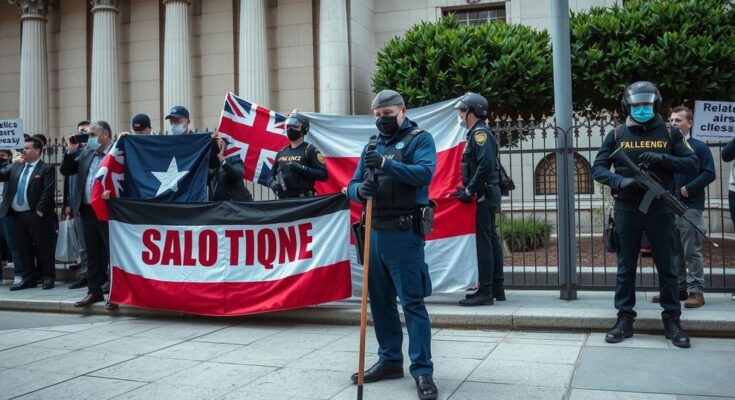Opposition figures in Venezuela claim that the government has placed a “siege” on the Argentine Embassy in Caracas, leaving them without electricity for over a month. They allege that this situation violates their human rights. Venezuelan officials deny these claims, attributing services cut-offs to unpaid bills. The incident reflects broader tensions between the Maduro regime and foreign countries, as diplomatic relations remain strained.
Five Venezuelan opposition leaders, currently seeking refuge in the Argentine Embassy in Caracas, have decried the government of President Nicolás Maduro for what they describe as an ongoing “siege” due to a month-long power outage. These activists have remained in the Embassy since March after arrest warrants were issued against them in connection to alleged efforts to destabilize Venezuela. Magalli Meda, an advisor to opposition figure María Corina Machado, stated, “It is a violation of our human rights,” emphasizing the dire conditions the group faces, which they claim have rendered the Embassy a veritable “embassy prison.” Additionally, water supplies have also been disrupted, compounding their difficult situation.
Venezuelan Interior Minister Diosdado Cabello has refuted claims of a siege, attributing the electricity cut-off to unpaid service bills. A sixth member of the opposition, Fernando Martínez Mottola, has recently surrendered and is now on conditional release. The opposition contends that Edmundo González Urrutia, their representative, won the presidential elections held on July 28, contrary to the claims of the Maduro administration, which was declared the victor by the electoral authority, a body often criticized for bias.
Relations between Argentina and Venezuela have further deteriorated following the recent arrest of Argentine Gendarme officer Nahuel Agustín Gallo in Venezuela under accusations of terrorism. Gallo’s family asserts that he was merely visiting as a tourist; the Milei administration in Argentina has condemned the incident as an “abduction” predicated on falsehoods. Meda has noted a lack of international diplomatic support, suggesting Venezuelan authorities have intimidated foreign diplomats from engaging on behalf of the opposition leaders.
The ongoing humanitarian crisis reflects not only the internal struggles of Venezuelan democracy but also the broader geopolitical tensions between the countries concerned. The silence from foreign diplomatic channels at the Embassy underlines the complex dynamics at play in the region, as representatives navigate both domestic and international pressures.
The article revolves around the plight of five Venezuelan opposition figures who have been sheltering in the Argentine Embassy in Caracas amid serious allegations against them by the Maduro government. Their situation reflects the broader context of political repression in Venezuela, where oppositional voices are often silenced or persecuted. The power and water supply disruptions they experience symbolize the Venezuelan regime’s broader tactics aimed at diminishing dissent and controlling opposition actions. Additionally, the strained relations between Argentina and Venezuela, coupled with the controversy surrounding the recent elections, illustrate the complex geopolitical landscape affecting Latin America today.
In summary, the situation surrounding the Venezuelan opposition figures trapped in the Argentine Embassy highlights significant issues of human rights violations, governmental repression, and the strained diplomatic ties between Argentina and Venezuela. The claims of a siege and subsequent humanitarian hardships underscore the challenging environment for political dissent in Venezuela, while the international response raises questions about the effectiveness of diplomatic channels in advocating for human rights amid political crises.
Original Source: www.batimes.com.ar




